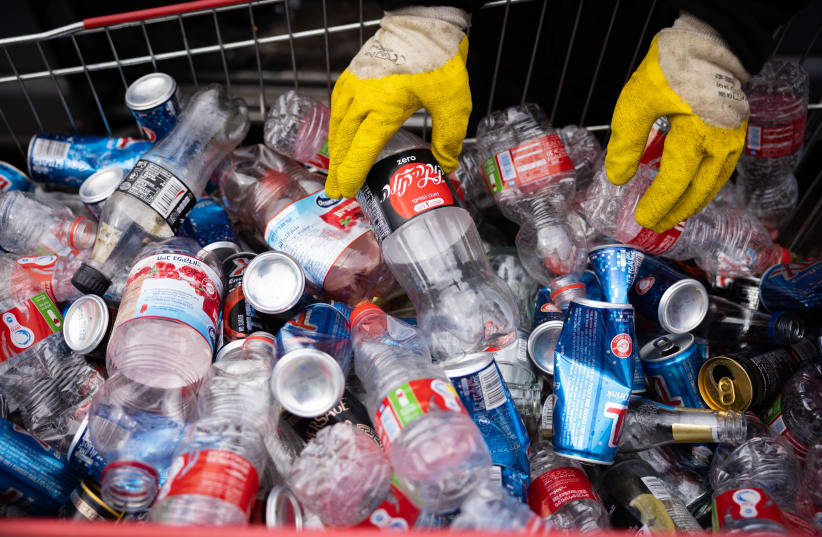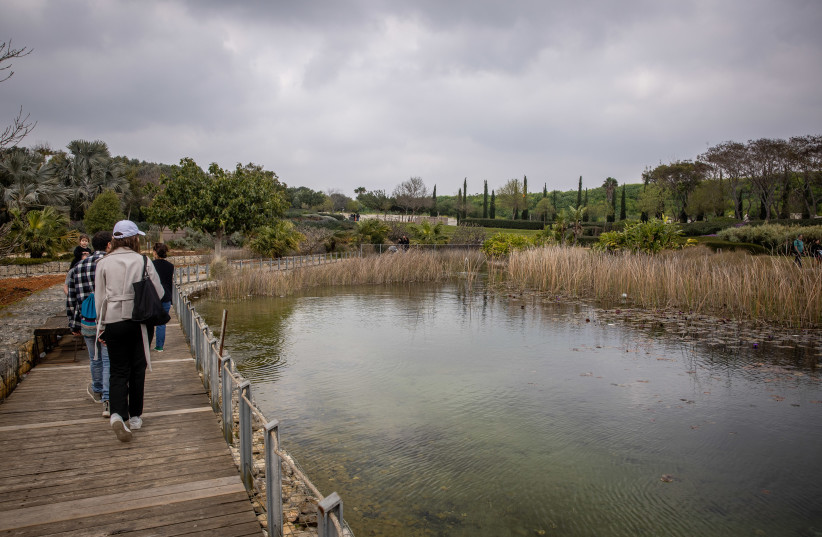Despite progress, the Middle East still faces significant challenges in waste management, including inadequate infrastructure, limited recycling facilities, and outdated cultural attitudes.
By VERONICA NEIFAKH/THE MEDIA LINE. MARCH 31, 2024

International Zero Waste Day, observed on March 30, serves as a reminder of the global effort to combat pollution and promote sustainable living practices. In the Middle East in particular, a region that is facing unique environmental challenges such as rapid urbanization, population growth, and water scarcity, zero-waste initiatives provide a beacon of hope.
Statistics related to global waste production are staggering. Every year, we produce 430 million tons of plastic, two-thirds of which are short-lived products that quickly become waste. Experts predict that over the next 25 years, annual municipal solid waste will increase from 2.3 billion tons to 3.8 billion tons.
The problem with waste is not just its unsightliness. Waste can contaminate soil and waterways and endanger life on land and in the water. Waste is also a significant contributor to greenhouse gas emissions due to the methane released by organic waste in landfills.
Although some use Zero Waste Day to celebrate moving our society to no longer produce waste, Ofira Ayalon, who teaches environmental management at the University of Haifa, said the idea is far-fetched.
“We’re a consuming society, and there is no way we can become zero waste,” she told The Media Line.

Ayalon pointed to the difficulties of life in the Middle East as one of the reasons for overconsumption.
“For a lot of people, shopping is a form of escapism,” she said. “I want to be seen with new shoes, a very fancy car, and a telephone. I want to show off and show that I can buy it. It’s feeling the comfort of the act of buying. This produces a lot of waste.”
Consumer dissatisfaction is another source of waste, Ayalon said. When a consumer realizes that the size, fit, color, or appearance of a new item is different from what was expected, the item may end up in a landfill.
Ayalon said that waste is especially problematic given the resources used to produce the items we use.
“You need energy, water, and manpower to produce something, even a banana, and when you throw it away, you throw away all of these resources,” she said. “If a banana goes into a landfill, it produces greenhouse gasses and leachate—the juice of the waste. It goes into water, underground water reservoirs, and pollutes it.”
As a society, we need to reduce the amount of waste we’re producing, Ayalon said. She called on Israel’s Environmental Protection, Education, and Economy Ministries to work together to educate about the importance of reducing waste and to incentivize decreased waste production.
“If it’s not done, the waste is constantly growing,” she said.
Eduard lives in The Middle East and adheres to the principles of reasonable consumption.
In 2017, Eduard visited Ariel Sharon Park, a green space and environmental education site built on what was once a massive landfill known as Hiriya. During his visit, Eduard learned about the immense effort involved in removal, sorting, processing, and disposing waste.
Inspired by his visit to the park and his love for swimming, Eduard started to attend plastic collection events on the beaches of the Mediterranean Sea, including in the village of Mikhmoret.
“Mikhmoret is a village slightly north of Netanya, with a maritime school and a veterinary clinic for injured marine creatures affected by various human actions or waste,” Eduard told The Media Line. “Mostly sea turtles are treated there after swallowing plastic bags, or having fins or paws entangled in bags or nets, broken shells from sea transport, and so on.”
Eduard tries to do his own part to avoid producing waste.
“I’ve been trying not to buy unnecessary things, using reusable bags, not taking plastic bags in stores, preferring to eat things that can be bought without packaging, for example, looking for places where grains are sold in bulk,” he said. “I eat meat and fish, but it’s difficult because there are hardly any places where you can buy them unpackaged.”
“I tried to buy milk with my washed-out jars, but the staff didn’t approve,” he added.
Eduard said that he thinks society needs more public awareness of these issues.
“When there is demand for this lifestyle, then supply will appear,” he said. “But on the other hand, I think we also need to understand that in the modern world, where everyone needs to be provided for, and logistics must be as cheap, convenient, and functional as possible, hardly anyone will bother with more ecological but less practical solutions.”
Denis, another Israeli, criticized the recent decision in Israel to repeal the tax on single-use tableware.
“I’m annoyed by the amount of single-use tableware in stores and, in general, the large amount of waste generated by one family,” he told The Media Line. “I think the public awareness efforts on this topic are lacking.”
What are Middle Eastern countries doing to promote sustainability?
Various Middle Eastern countries have launched initiatives to tackle waste management and promote sustainability. The Middle East waste management market is set to exceed $50 billion by 2030, as companies in the waste management sector are actively embracing circular economic practices in order to enhance environmental stewardship and establish themselves as forward-thinking entities.
Among other countries, the United Arab Emirates, Qatar, Saudi Arabia, and Lebanon have all developed initiatives to reduce waste. Jordan’s initiative emphasizes waste segregation, recycling, and community-led initiatives. Israel uses government support and innovation-friendly policies to reduce waste and increase recycling rates.
Yet despite the progress being made, the Middle East still faces significant challenges in waste management, including inadequate infrastructure, limited recycling facilities, and outdated cultural attitudes towards waste.
Ayalon, the professor of environmental management, said that Israel is not meeting its own waste reduction targets. She described Israel as “a third-world country” in terms of waste management.
“The Ministry of Environmental Protection, which is the sole regulator in the issue of waste management in Israel, set a new target that is to reduce landfilling to 70%. The current landfilling is about 80%. I’m not sure that even this very low target will be met, but this is the current policy,” she said.
Yaakov Jerome Garb, a professor of sociology and anthropology at Ben-Gurion University of the Negev, told The Media Line that waste plays a different role in societies in the Global North and the Global South.
“The Global North refers to the overdeveloped countries—North America and most of Europe,” he explained. “The Global South is made up of underdeveloped countries—much of Africa, portions of South America, and portions of South Asia. For example, with Israel-Palestine, you have the Global North and the Global South right next to each other.”
In the Global North, he said, societies face a problem of excess consumption. “There’s not much thought given to what happens at the end of the life of all the things that we produce and consume,” he said, noting that this dynamic often results in improper or environmentally harmful disposal of waste.
Garb said that people in the Global South tend to take a different perspective on waste. “For example, electrical waste that cannot be effectively recycled in Israel will be gathered and taken to the West Bank where it can be economically recycled or dismantled,” he said.
Things need to change in both the Global North and the Global South in order to fix the problems caused by waste, Garb explained.
“The problem is on both ends. On the manufacturing and consumption end, there are no thoughts about what happens at the end of products’ life, and across the Global South, waste can be a means to livelihood, but it also meets the lack of capacities for proper recycling. There’s too much thoughtless production and consumption on the one hand and poverty and lack of opportunities on the other hand across the Global South. When those two things meet each other, it’s bad news,” he said.
https://www.jpost.com/environment-and-climate-change/article-794607
